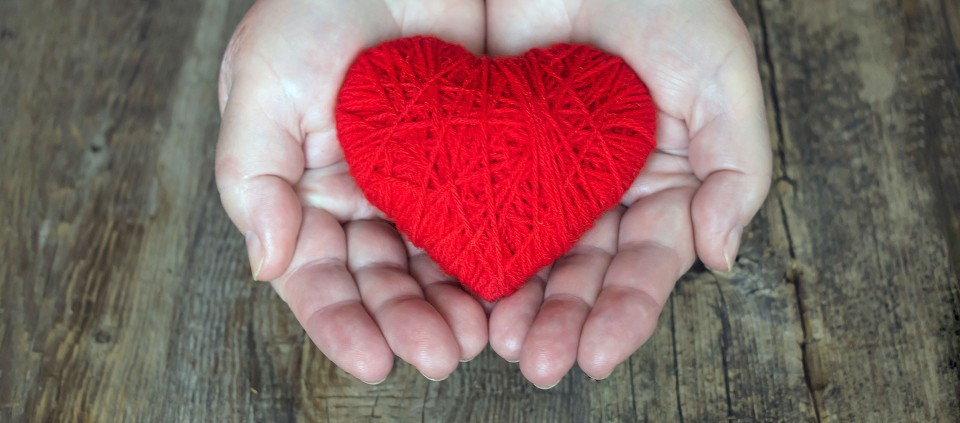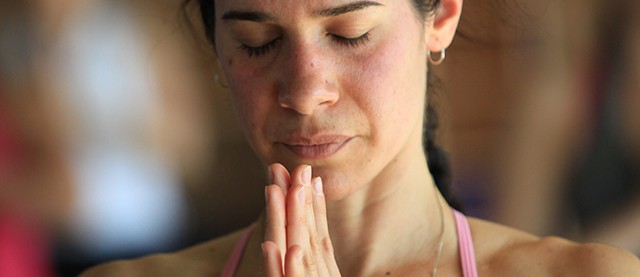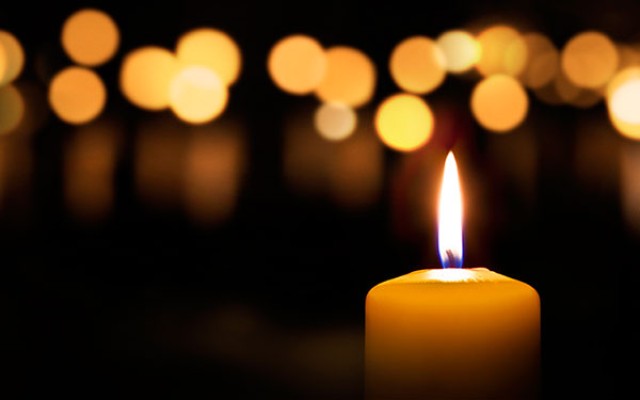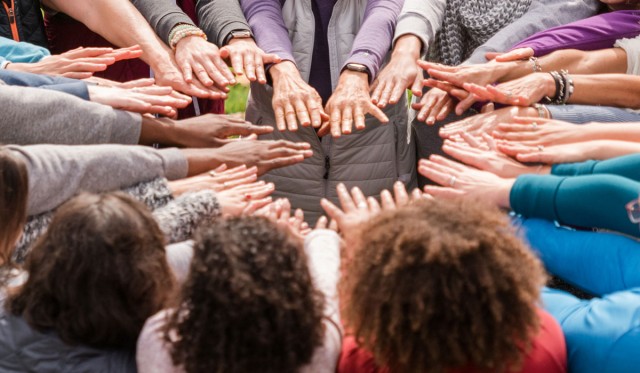What Is Karma Yoga?

The word karma means “action” in Sanskrit, and karma yoga, also called seva, is the practice of selfless service—taking action and letting go of the outcome of that action.
Karma yoga is the practice of this selfless action as an intentional and integral aspect of one’s spiritual path. Swami Kripalu saw karma yoga as a natural outgrowth of love and an effective tool for personal and spiritual growth.
Here, five longtime Kripalu teachers share stories about what karma yoga means to them.
Karma Yoga and Nonattachment
Years ago, Aruni Nan Futuronsky, a life coach and faculty member at Kripalu, ran the Kripalu Kitchen, where she and her team practiced living the mantra, “It’s not about lunch.”
“Of course, it was about lunch—hundreds of hungry guests were waiting,” says Aruni. “But more importantly, it was about the practice of being present in the moment, putting our personal needs and agenda to the side, and showing up for the service. Be it cutting tofu, washing dishes, vacuuming rugs, or teaching workshops, to be grounded in selfless service is a freedom for the practitioner and a gift to the receiver.”
And it’s not always easy, she notes. “Deep down there are times when we all perform acts of kindness because of how we believe they will make us feel. Our acts confirm that we are good people and give us a warm feeling. Even if we don’t expect to receive anything tangible in return, when our act is done with attachment to the outcome, it binds us to the ego, and that can be a vicious cycle.”
But when we do karma yoga with self-awareness and a full heart, it can become an anchor for both practice and life, Aruni says. “To serve another, to be useful, to contribute with loving-kindness, can become a center in one’s life.”
Karma Yoga on the Front Lines
Micah Mortali, Director of Outdoor Education and Programming at Kripalu, believes that the practice of taking skillful action without attachment to personal gain is “a life practice for every moment.” That was brought home to him deeply while watching footage of first responders following the Boston Marathon bombing in 2013.
“Watching those EMTs, police officers, National Guard troops, and marathon volunteers rushing into danger, selflessly, I realized the true power of seva,” Micah says.
Karma Yoga Is in the Little Things
Coby Kozlowski, a faculty member for the Kripalu School of Yoga, thinks of karma yoga as “inspired action” or “skillful living.” In day-to-day life, she says, that means finding ways to contribute that help you and those around you feel more alive and more connected. “When I think about karma yoga for myself, as an idea of skillful engagement and participating with life, I think, what is my unique calling and how I can offer that out as a unique gift to the world to truly make it a better place, since we’re all contributing to this collective world we live in?”
There are big ways and small ways in which we can be of service to one another, says Coby. The little ones might be “pausing before I speak, practicing self-care to refill my well, giving a smile to someone I’ve never met, or going out of my way to offer support or assistance when someone’s needing an extra hand,” she says. “These are all ways we can live our yoga.”
Karma Yoga and Dharma
Practicing karma yoga also means fully accepting one’s dharma, or life calling. Stephen Cope, Kripalu Scholar Emeritus, describes karma yoga as “a very explicit path for transforming a life of passionate action into a spiritual life.”
The Bhagavad Gita, the primary ancient text of yoga, describes a life of action in the world, but “action that is done so skillfully that it transforms both us and the world,” Stephen explains. The practice of karma yoga, he says, first involves the discernment of your true calling and then passionately throwing yourself into your deeply felt vocation, relinquishing any concern for success or failure.
“This requires the practice of yoga in order to deepen one’s attunement to inner calling,” explains Stephen, “and then it requires the capacity to be total and wholehearted in the pursuit. There’s a wonderful sense of ease that comes from living this way, a sense of being part of something much bigger than our small selves.”
Karma Yoga and the Power of Love
“In my few years of being in Swami Kripalu’s presence and many years of studying his life, what I’ve come to understand about the practice of service is nothing short of understanding life in general,” says Vandita Kate Marchesiello, Kripalu Historian. “His well-known quote encapsulates the simplicity and power of service: ‘Serve with a full heart. By making others happy, you make yourself happy.’”
“It is our true nature to feel connected to the earth and others, but along the way, we get distracted by a myriad of other things,” Vandita says. “When we remember these connections and derive joy from everyday life, we naturally and effortlessly are called to serve everyone around us in exactly the way that is being called for. Swami Kripalu taught that this was one of the highest expressions of love.”


